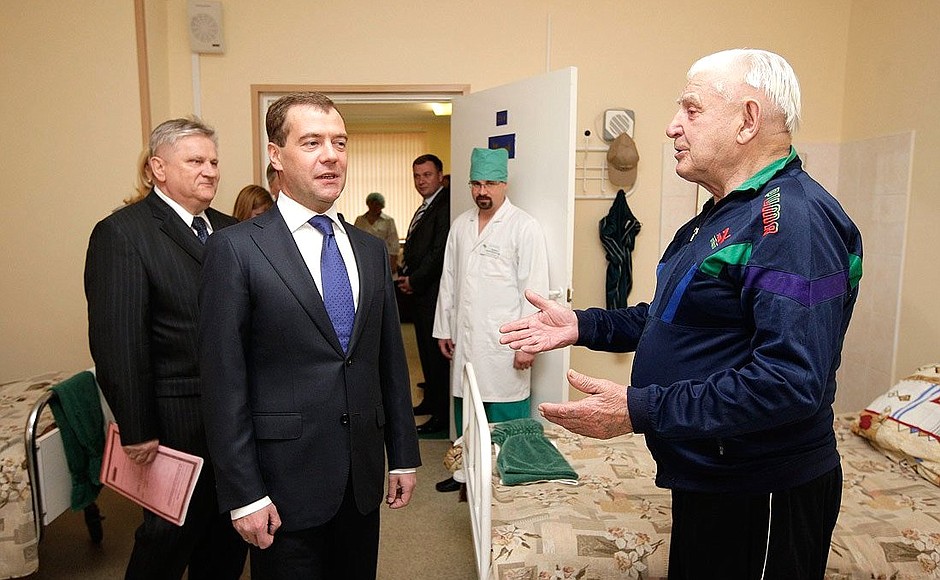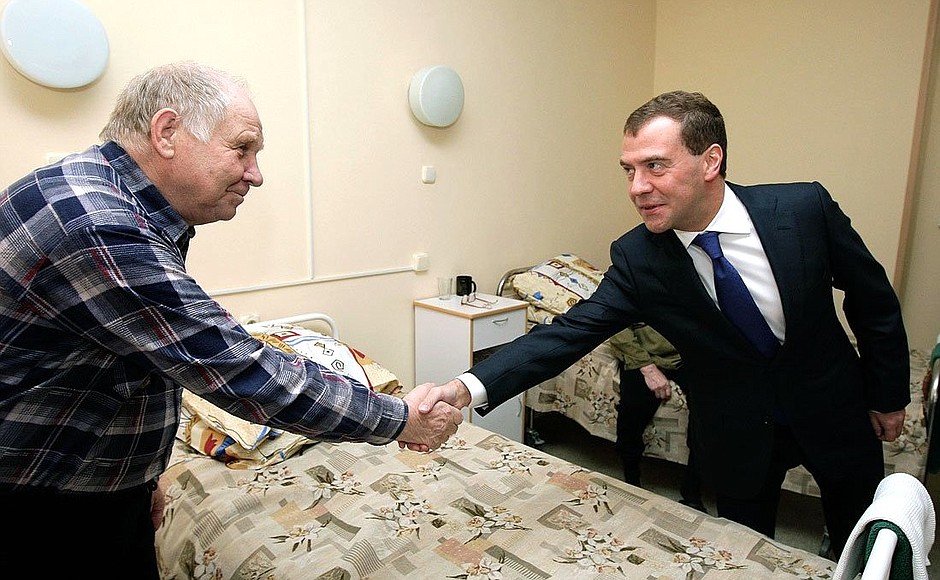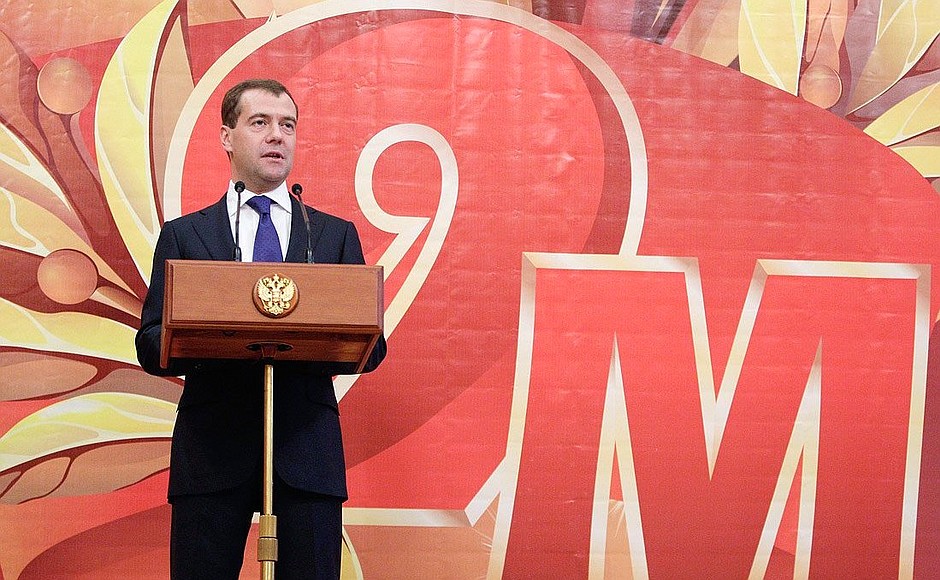Speaking at the award ceremony, held at the Moscow Region Hospital for War Veterans in Moscow Region’s Solnechnogorsk District, the President said he has made frequent reference of late to the victory in the Great Patriotic War in his addresses both at home and abroad, and always stresses that were it not for the Red Army’s victory in the war against Nazism the world would look very different today. Later generations should remember this victory with gratitude and not let it be devalued or used by politicians to pursue their personal ambitions, Mr Medvedev said.
The President visited several of the hospital’s departments and spoke with medical staff and patients.
In all, 65 hospitals for war veterans from around Russia took part in the contest. First place went to Samara Region Clinical Hospital, Moscow Region Hospital for War Veterans and Krasnodar Territory Hospital for War Veterans shared second place, and third place was shared by hospitals in St Petersburg, Chelyabinsk, and Ulyanovsk Regions. All of the hospitals received large sums of prize money as incentives for their staff.
* * *
President of Russia Dmitry Medvedev: Friends, good afternoon.
First of all, I would like to take this opportunity to congratulate everyone on our wonderful holiday: the upcoming Victory Day.
And today, on the eve of this special day for our nation, I would like to hold the Best Hospital for War Veterans award ceremony right here at one of the winner hospitals.
All of you here are familiar with the figures: every year, over 300 thousand war veterans undergo treatment at such hospitals. We have 65 military hospitals and another 78 military medical facilities within the Defence Ministry structure.
I will say a few words about how things stand in this area overall, but first, I would like to talk about the mission you are fulfilling and why it is important.
Naturally, our fathers and grandfathers lived through some very difficult ordeals: they fought, they won, and they gave us all a normal, decent future. In spite of the hardships we face, and the difficulties that our nations faces, we all understand that we owe our lives, our work, and our modest achievements to the veterans who defended the independence of our Motherland.
Recently, I have spoken about this on several occasions in different nations, including nations that have changed a lot in recent years. You know, I told nearly all of them the same thing, which is that if it weren’t for the victory by the Soviet Army, the Red Army, at that time, then there would be no modern Europe – nor, for that matter, a modern planet – as we know it today. We must always remember this.
As for our own nation, we must lead by example and show care toward our veterans – the very people who were truly at the foundation of our recent achievements — maintaining peace on our planet and our continent. We should demonstrate our care by keeping all of their great deeds performed in those years in the grateful memory of future generations. We should not allow these memories to be devalued or fade. Moreover, we must not allow them to be distorted to serve any political ambitions; this information must remain truthful. And everyone present here works toward this cause.
Medical personnel carry a special responsibility: you are preserving the lives and health of war veterans, who not only brought about victory during the war, but who also serve as invaluable guardians of information about that time. And naturally, you know yourselves that the care and sensitivity of medical staff – of all those working in these military hospitals and medical facilities – often mean more than the medical resources at your disposal.
This does not mean that we should reply only on our personal qualities, like kindness of health professionals, their sensitivity, and their understanding. We must invest considerable funds, because the world is changing. Even being here at this hospital (which was established in 1983), it is clear that the resources and capabilities we had back then are different from what we have today.
No matter how good the achievements of Soviet medicine were, it is entirely clear that today’s medicine cannot be the same. It must be high-tech, modern, and rely on scientific achievements. It must create normal conditions for treating patients and normal working conditions for medical staff, taking into account all aspects of these jobs, including salaries.
The material and technical base of such hospitals must be developed the same way as with other medical facilities. In this context, I have signed an order to allocate 260 million rubles from the Presidential Reserve Fund to supply hospitals with modern medical technologies and equipment. Clearly, this money is not enough to re-equip every hospital. The sum may seem relatively small, but nevertheless, it is still an important contribution to this cause, because as you know, the state of a hospital depends on joint effort of different authorities.
Federal authorities at the top must provide the general working conditions. A great deal depends on the kind of attention given to the medical facilities by governors and regional administrations. You know this firsthand. If a governor considers this to be an important undertaking, then the hospital is in good shape, it looks nice, and the veterans are happy; they are well taken care of and receive the right medical services, as well as adequate medical care. You also know what happens if the governor does not give attention to these hospitals.
Unfortunately, we still have quite a few such medical facilities. Thus, our work needs to be a joint effort. The Federal government, and in some cases, the President, must provide funding; governors must pay attention to the issue; and municipal authorities and local businesses must also join in, because this kind of work is normal and humane. That is the only way to make this situation acceptable. I hope that this will help improve the quality of our work.
There is another topic that has brought us all together: the contest that takes place for the second time. In my view, contests always have a certain symbolic significance. They are not so much about money as demonstrating one’s achievements and simply seeing how other colleagues are doing their work. To learn from your colleagues and to let your colleagues learn from you. Contests also provide an opportunity to support those facilities that introduce and employ modern diagnostics methods, taking advantage of innovative achievements in modern medical science and practice, and helping spread best practices. All the hospitals that participated in this contest demonstrated their best qualities.
This year, we allocated 10 million rubles toward bonuses for employees at the winner hospitals. I signed a respective order on March 27. The hospital in first place will receive 3 million rubles; second place is 2 million, and third place is one million rubles I prize money. This money must go toward bonuses for employees; I do not need to explain to you how difficult your work is.
The Samara Region Clinical Hospital for War Veterans is in first place. It was established and ‘tempered’ during the difficult war years. Second come two hospitals: the Krasnodar Territory Clinical Hospital for War Veterans, which underwent major re-equipment, and the Moscow Region Hospital, which has welcomed us today and which has developed effective approaches for treating and rehabilitating veterans. I just saw it myself when I took a quick tour around the hospital before this event and saw how everything is set up. The third place winners are the St Petersburg, Chelyabinsk, and Ulyanovsk regional hospitals for war veterans, which have also achieved very good results. We understand that all these decisions are still sort of relative. All of you have done a great job and you are all winners, so I sincerely congratulate you.
Before moving on to the official award ceremony, I would like to once again thank you for your very difficult work, which is highly significant to our nation. I want to wish the best of health to your veterans, as well as everyone who is working and undergoing treatment at your hospitals. And, of course, I would like to congratulate everyone on the upcoming Victory Day.
I felt that it would be best to hold this ceremony here, on-the-spot, so to speak. But I understand that not everyone with us today has visited the Kremlin, so if any of our award winners would like to take a tour of the Kremlin and see what it looks like inside, I wholeheartedly invite you to visit; we will set up a tour. Now, let us begin the award ceremony.
<…>
I am very glad to have come here. I do not know why general secretaries [of the CPSU Central Committee] did not come here; they were probably too old, but I am very happy to be here today. I am happy because this is a big, friendly community representing different hospitals, but also representing people who are doing extremely important work: helping our veterans and making their lives longer. What could be nobler? Thus, I would like to once again express our enormous gratitude.
Some of the best qualities of our people include not only the resilience that allowed our veterans to overcome the enormous adversity that befell our Motherland, defeat their enemies, and reach their goals, but also another great quality that distinguishes the Russian people – our big heart, our ability to sympathize and understand. Everyone present here has this quality.
I would like to once again congratulate you on this holiday and on the results you achieved. We truly count on you. Thank you.


